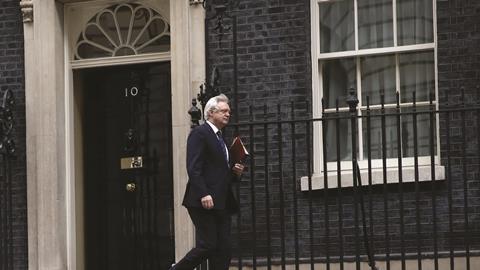Today’s column was not difficult to plan. We knew long in advance that 19 June would be the day on which the incoming government would outline its legislative programme and begin Brexit negotiations in Brussels.
By the middle of last week, though, all the old certainties had gone. There would still be a Queen’s Speech this week but it seemed that the Conservatives would have to jettison some of their manifesto commitments. And the UK would still leave the EU, though it now looked as if our relationship with Europe might end up being much closer than the prime minister had intended.

Ahead of the formal announcement, we could only speculate on whether the Ministry of Justice would bring back a major bill that had lapsed when the election was called. That was the Prisons and Courts Bill, which would lay down a new statutory purpose for prisons. It would also pave the way for online courts, both criminal and civil.
The bill was seen as largely uncontroversial – except for part 5, which would greatly reduce the damages payable to people who have suffered whiplash injuries in road traffic accidents. So there seems a good chance that it will be reintroduced much as before. The government could usefully start its bill in the House of Lords, where peers sometimes find themselves at a loose end in the early stages of a new parliament.
That would allow MPs to concentrate on the Great Repeal Bill, which we are expecting the government to introduce very soon. It will be the most important bill to come before parliament since the European Communities Act 1972, the act it will repeal.
The Great Repeal Bill will also convert all EU law – as it stands on Brexit day – into UK law. That includes directly applicable EU regulations. It includes UK laws introduced to implement EU directives. It includes EU treaty rights such as equal pay. And it includes EU court case law.
The repeal bill will allow the statute book to be ‘corrected’ by an estimated 800 to 1,000 statutory instruments. But, said the government, it ‘will not aim to make major changes to policy or establish new legal frameworks in the UK beyond those which are necessary to ensure the law continues to function properly from day one’.
Those changes will be made instead through separate bills, dealing with issues such as customs and immigration. These later bills – perhaps as many as 15 – will be contingent on this one.
Logically, the repeal bill needs to be in place before EU-derived law can be amended. ‘Unless and until domestic law is changed by legislators in the UK,’ the government said in a white paper it published in March, ‘legal rights and obligations in the UK should where possible be the same after we have left the EU as they were immediately before we left.’
Although the government wants its repeal bill enacted in good time, it will not take effect until the moment we leave the EU – currently scheduled for 11pm UK time on Friday 29 March 2019. That deadline – midnight Brussels time – is specified in ‘negotiating directives’ published by the European Commission last month. The commission’s aim is to reach agreement on what it regards as the Brexit priorities before negotiating the UK’s ‘disentanglement’ from its EU obligations.
The government ‘will not aim to make major changes to policy or establish new legal frameworks in the UK beyond those which are necessary to ensure the law continues to function properly’
As David Davis, the reappointed Brexit secretary, acknowledged last week, the first of these priorities is citizenship. People from the remaining EU states – referred to as EU27 citizens – would be able to acquire permanent residence in the UK after living there for five years, as will their families, and the same would apply to UK citizens living in an EU27 country. Those rights should be enforced by the EU court of justice in Luxembourg, the commission says. And they should be protected for the lifetime of those concerned, which means the court’s jurisdiction over the UK would continue well beyond the year 2020.
There is more scope for questioning details of the financial settlement. Brussels wants the UK to pay for all the commitments it made while it was an EU member. No doubt the UK will argue that it should not carry on paying for services that it no longer enjoys.
The commission’s third priority is Northern Ireland and the need to avoid a hard border with the Irish Republic. Free movement of people between north and south is favoured by all concerned. But that may be difficult to reconcile with free movement between Northern Ireland and Great Britain, regarded as essential by members of the Democratic Unionist Party on whom the government is relying for its survival.
All this, as the government frankly admitted in its white paper, will involve ‘a substantial challenge for both government and parliament’. And that was before the uncertainties we see today.
joshua@rozenberg.net
































3 Readers' comments